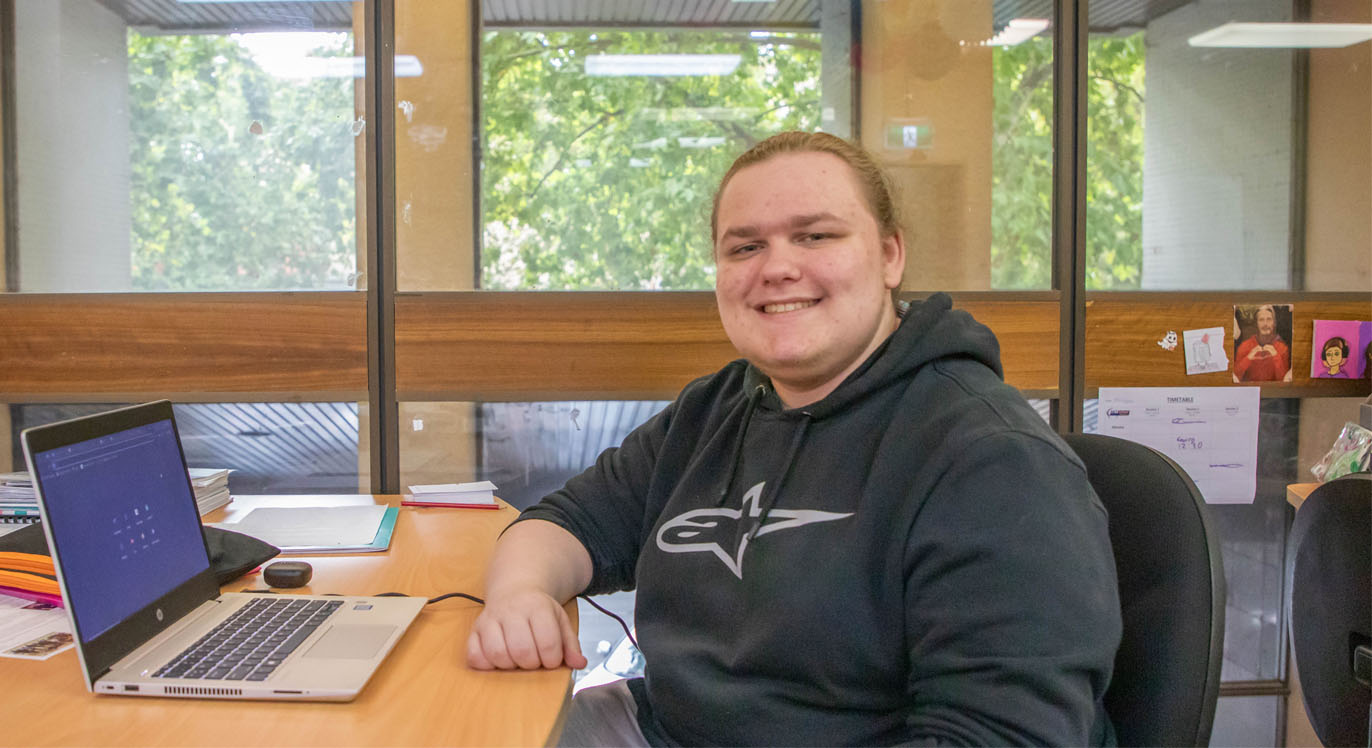When asked for the best word to describe his experience of BSSC, Year 12 student Connor De Petro chose ‘inclusive’.
“I could not recommend NETschool and the wider BSSC college more highly. No matter what your interests, or your needs, there will be a place for you.”
Connor has been diagnosed with autism and endured a difficult time at his previous college where extra support was not put in place to support him.
At the end of Year 10 and with some nervousness, he applied to join BSSC’s NETschool. He worried switching colleges would disrupt relationships with friends he’d had since primary school and the hoped-for support might not be given.
Not only have these friendships survived the move, he’s made many new friends—and found all the support he needs.
“Straight away I felt like I could relax,” he recalls. “I was offered extensive support and quickly made friends. My mentor, Jim Cowie, was just awesome. Every day he made me laugh.”
Connor says he’s much more content, his confidence has grown, and he’s developed study and writing skills that work well for him.
He’s also been impressed with the way his teachers and mentors both push him to excel but are also empathetic about the fact no-one can perform at full-speed all day, every day.
“Joining NETschool has made a massive difference to my life. I had always strived to be happy, but the daily dread I used to feel going to school was crushing. That’s all gone now.
“Unlike other schools I’ve been to, being able to wear whatever I want makes me feel at home—and definitely more comfortable about going to school.”
Connor’s voice is full of enthusiasm as he talks about the variety and quality of subjects he discovered were on offer at BSSC—such as Ancient History.
“Health & Human Development has been a blast too. We’ve looked at health from a physical, mental and even spiritual perspective.”
Connor’s favourite subject is Legal Studies and he has plans for a future career in the legal field with a particular interest in Civil Law and Human Rights.
“The main thing is to help people. I want a good job, but nothing too fabulous, and good friends. I would also like to continue to develop my interest in drawing and maybe even have a go at animating a simple story.
“In the end I just want to be happy.”
Asked how he unwinds, Connor says talking to his friends or playing video games works for him.
He has great support from family at home and suspects his own capacity for empathy has come from his parents who he describes as “warm and kind”.
“Dad is amazing, and Mum, who is a nurse, highly values helping others and loves her job. I could easily write 1000 words on her.”
When he was younger, Connor’s autism caused him to have lots of meltdowns—frequently in the car on the way to school. He saw how much these behaviours impacted his mum but couldn’t control them.
Both Connor and his sibling have autism but their Mum has made sure they got the academic, medical and psychological support they needed.
She also constantly told Connor he was going to be alright.
“She created alternative ‘what if’ scenarios to my ‘what if’ fears, by asking ‘so what?’
“Mum would ask me what was really so terrible? She shrank those fears down with comments such as: ‘So you fail a test? So what? There will be other tests, other days. You will survive’.”
Many people with autism experience distressing meltdowns and learning to deal with them is an important part of building confidence to manage this particularly challenging aspect of autism.
When he looks back at himself as a twelve-year-old, Connor remembers worrying he would never have enough friends—and that he would never get control over his meltdowns or be able to simply enjoy going to school.
“Sometimes Mum would just have to hold me for half an hour or until a meltdown settled. I worried constantly, catastrophising those ‘what if’ scenarios.”
Such worrying drained his energy and made school even harder.
“I’d like to go back and tell myself, ‘You’re going to be fine’.”
“I would also encourage people looking for a psychologist to persevere. I think the excellent therapy I had really made a difference, but it took me a while before I found the right person to work with.”
Connor hasn’t had a meltdown for years, for which he is very grateful. He’s also grateful for being loved.
“Especially, but not just, by my family. The acceptance of friends and support of teachers and mentors is also a kind of love. It doesn’t have to be something intensely intimate to be love.”
Connor’s insight about the power of love/support/friendship spills over into his estimation of global issues.
“I see too much judgement, too little listening, not enough open-mindedness and all of this, when it ends up online, can totally misrepresent a situation or a person.
“I think we need to listen more and be more open-minded.”











